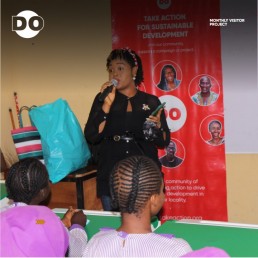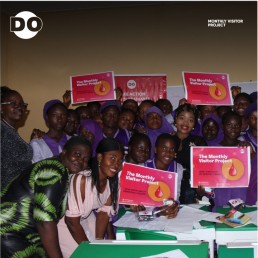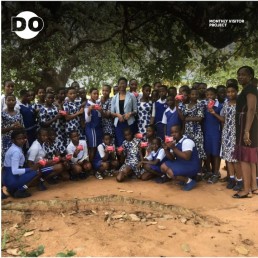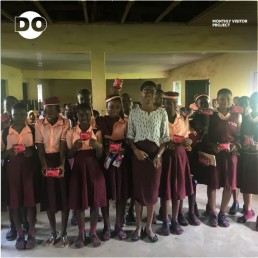21-year-old Priscilla Mtswenem fled her home in Mbaguen, Benue state, with her family following attacks by criminal herders. They now stay in a camp, Tse Yandev, in Makurdi.
Before now, Priscilla’s parents could afford to get her sanitary pads for her menses. Now, Priscilla uses old clothes and leaves to manage her period.
Priscilla is a needle in a haystack of women and girls in conflict and post-conflict zones who resort to unhealthy practices like using rags and leaves for menses or sitting on an old tin can during their menstrual period.
Period poverty is the lack of access to sanitary products, menstrual hygiene education, toilets, hand washing facilities, and waste management.
Period poverty is particularly dire in conflict zones.
On a normal day, women and girls don’t look forward to menstruation because of the discomfort, pain and hormonal changes that accompany it.
Imagine dealing with hormonal changes due to menstruation while having to watch your back every second.
Imagine experiencing excruciating menstrual pain when bullets wheeze past your ears, and you hear the screams of unfortunate victims.
Imagine managing your heavy flow when you can barely afford a decent meal.
It is unthinkable the ordeal women and girls in conflict zones go through just to survive. Having to deal with menstruation in such times is one of the worst dilemmas a woman can ever experience.
Challenges women and girls face while menstruating in conflict zones
In times of war, everyone is concerned about survival and getting to safety. People flee their homes without sparing a thought about essentials like sanitary products.
Even when nonprofits send relief materials, the top priority is usually food and medication.
So, when a woman or girl finds herself menstruating in such a dilemma, they use old clothes, rags or leaves to manage their flow.
In post-conflict settings, women and girls cannot afford expensive sanitary products. Sanitary products range from $1.5 to $2.0 per pack; that’s a lot for families in IDP camps who can barely feed themselves. What little money they can make is spent to get food for their families.
Girls in post-conflict settings that are opportune to attend school miss school during their period to avoid the embarrassment of being stained because their parents cannot afford sanitary products. As a result, these girls fail academically and eventually drop out of school to face the inevitable fate of child marriage.
Some of these girls go as far as trading sex for money to be able to afford sanitary products to manage their period.
Then, there’s the lack of access to clean toilets, hand washing facilities and waste management. In most post-conflict camps, they dig pit toilets as a convenience which is not convenient for women and girls, especially during their period. There’s hardly access to clean water, soap, and proper waste disposal to manage their period.
How Do We Take Action
The first line of action is to call on the government, NGOs, INGOs, health organisations and other concerned organisations to include menstrual hygiene education and distribution of free sanitary products in their outreach programs in conflict and post-conflict zones.
Also, these women and girls should be taught how to produce reusable pads using locally sourced materials. Knowing how to produce reusable pads can serve as a passive income and ensure they never lack sanitary products to manage their period.
Efforts should be made to install gender-specific toilets with hand-washing and waste management facilities in conflict and post-conflict zones; this will give women and girls a safe space to manage their period away from the prying eyes of the opposite sex.
What we do at DO
The Monthly Visitor Project by DO is a sensitisation workshop to teach adolescent girls how to make reusable sanitary pads in rural and semi-rural communities.
Here at DO-Take Action, our Grassroots Development Champions (GDCs) carry out this workshop in their respective communities to educate women and girls in underserved communities on menstrual hygiene, distribute free sanitary products and teach them how to make reusable pads.
25-year-old Promise Nzubechukwu Ubanatu, a Grassroots Development Champion, executed this impact program at Jikwoyi Model Secondary School (JMSS), Dagbana, Abuja, where she educated the students on menstrual hygiene, taught them how to produce reusable pad, and distributed 90 pads to 30 underprivileged girls.
22-year-old Esiobu Ngozika Peace also executed this project at Girls Secondary School, Umunebo, and Premier Secondary School, both in Ogbunka, Orumba South local government area, Anambra State. She supported 50 students with 100 free sanitary pads after teaching them menstrual hygiene management and how to produce reusable pads.
What is your response to period poverty in conflict and post-conflict zones in Africa?
Take action today to help women and girls like Priscilia observe their menstrual period in dignity.
Click here to become a Grassroots Development Champion and execute a project in conflict and post-conflict zones in Africa.
Click here to partner with us or sponsor a “My Monthly Visitor” project in IDP communities.
Sources



